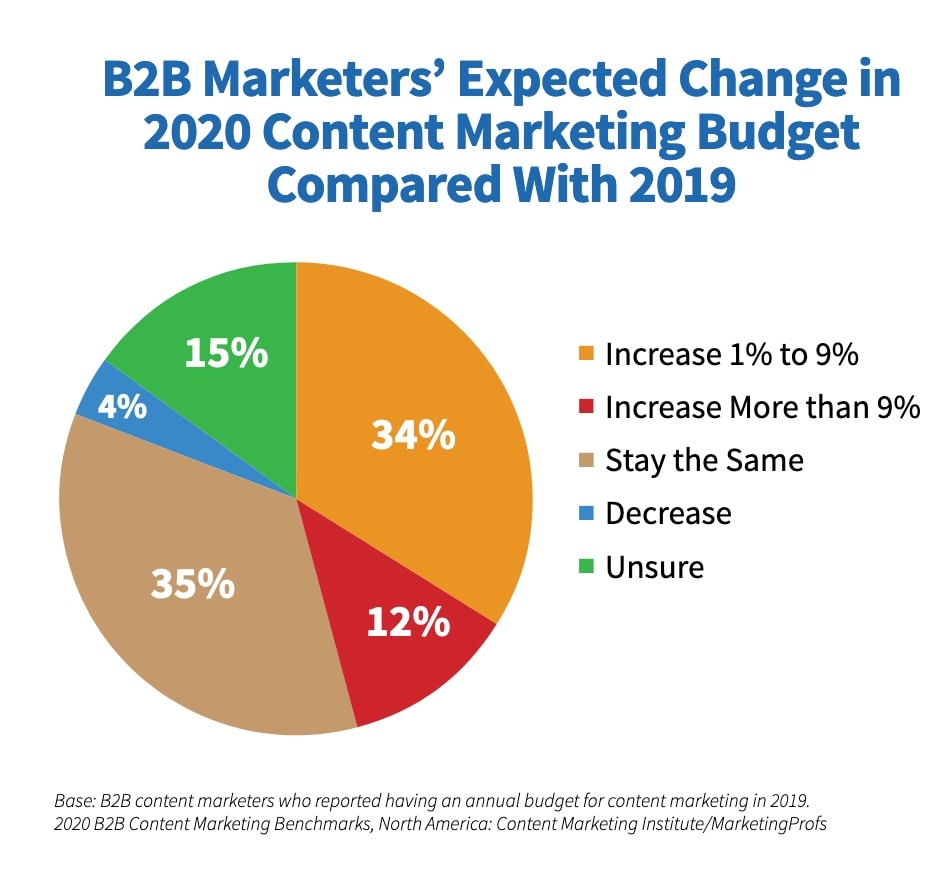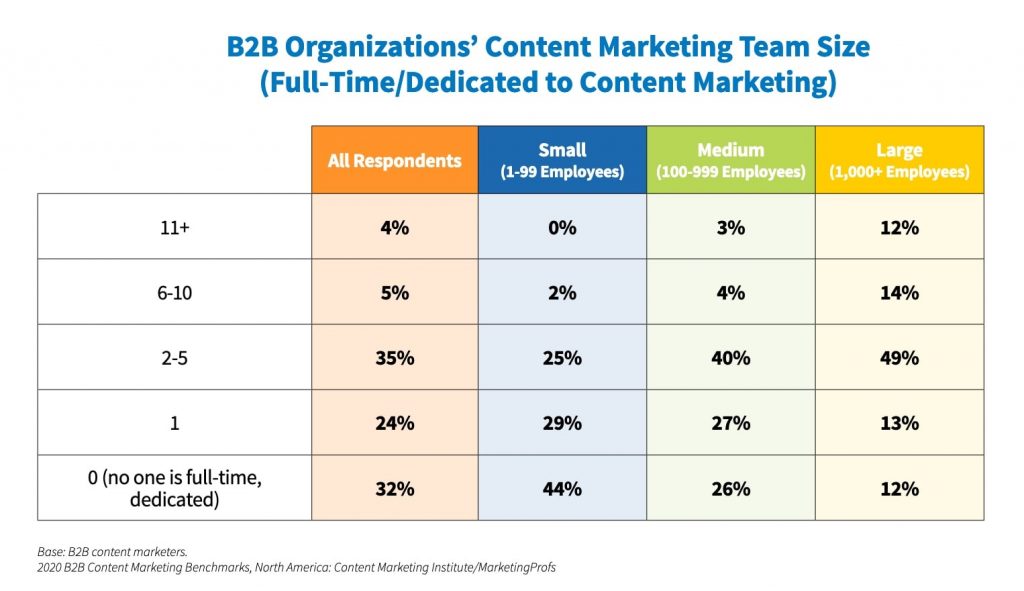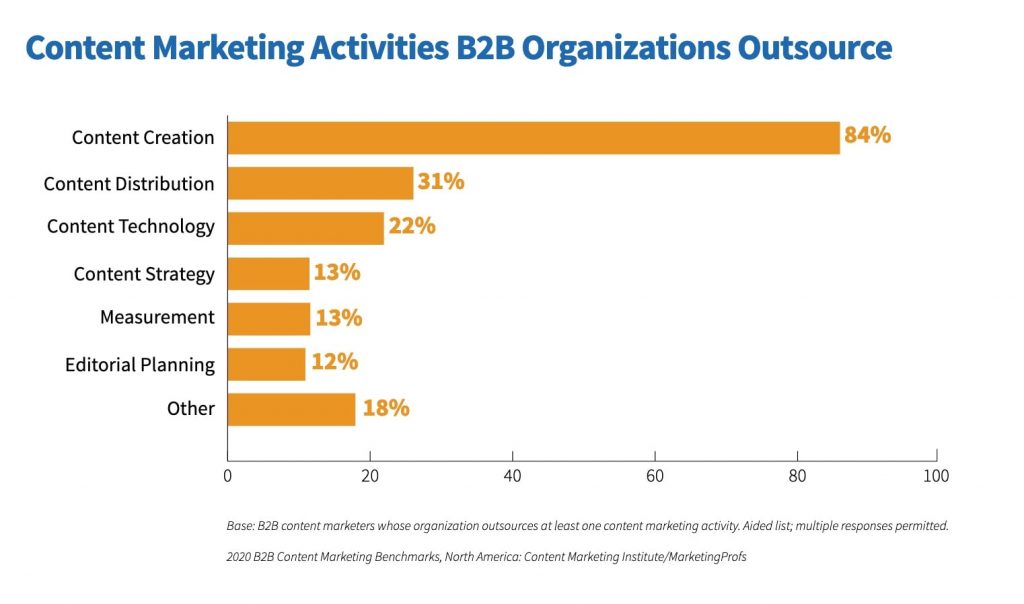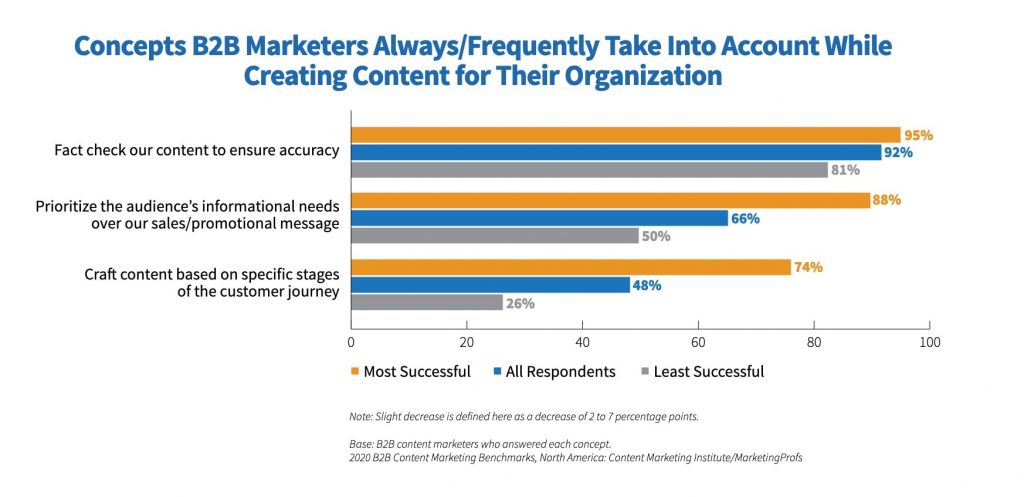While the basics of good B2B (business-to-business) content marketing tend to stay consistent, the details of what the industry looks like as a whole change every year. To keep the pulse of how companies in the B2B space are approaching content marketing, each year the Content Marketing Institute releases their research on B2B benchmarks, budgets, and trends.
Reviewing the whole thing is worth it—it’s packed with useful data. But if you want a peek at what’s in there first, here are some of the standout pieces of information shared this year.
- Businesses continue to invest more in content marketing.
No surprise here. As trust in content marketing grows, many companies expect to see their budgets grow as well. 46% said they anticipate a larger budget in 2020, and notably only 4% expect to see a decrease.
That suggests that B2B companies believe in content marketing and are seeing results they like. And it’s good news for content marketers, as it means our jobs should be secure, and bigger budgets can open up access to better resources for achieving our goals.

2. Most internal content marketing teams are small.
In spite of the trust shown through increased budgets, B2B companies are still slow to invest in full-time employees. Nearly a third of companies don’t have anyone dedicated to doing content marketing full time, and close to another quarter have only one person.
Anyone familiar with content marketing knows that it’s a lot of work. One person (or less!) handling all the content marketing for an entire company is unsustainable. For those that have grown beyond one person, two to five is the norm, which still likely means a lot of overwhelmed employees.
And somewhat surprisingly, this is a trend across business sizes. As you’d expect, small businesses are much more likely to have 0-1 person devoted to content marketing full time. But even 74% of large businesses in the survey said they have fewer than five people on the team.

3. B2B marketers are using freelancers.
Teams of that size can’t do all the work of content marketing effectively alone. Those small teams make a lot more sense when you learn that 50% of all respondents in the survey say they outsource some of their content marketing work.
While the survey doesn’t break down who they’re outsourcing it to—and marketing agencies will account for some portion of the outsourced work—it’s a safe assumption that some of it is going to freelancers.
The most common type of work companies are outsourcing is content creation. That bodes well for us who offer B2B content marketing writing services, as well as anyone that helps companies make videos, podcasts, infographics, or interactive content.

4. Outsourcing works.
Some in-house content marketers may worry that an outside party won’t be capable of learning your brand and audience well enough to do good work. The survey data shows no clear correlation between how successful a company is and whether or not they outsource.
That suggests that you can hire freelancers and agencies and still see success with content marketing. The right content marketing freelancer will know how to do the research to learn all they need to know about your business and audience. And hiring someone skilled to help out will definitely produce better results than trying to do everything with too few people—a surefire path to content marketing burnout.
5. Serving customers’ informational needs is (still) important.
This probably isn’t news to anyone reading. Content marketing is all about helping your audience first so you can build a relationship, and trusting that will lead to sales down the line. Yet a third of companies in the survey said they still don’t prioritize serving their audience’s needs over pushing a promotional message.
This is a significant differentiator between those who are successful and those who aren’t. 50% of companies who report not feeling successful with content marketing don’t prioritize the audience, 88% of those who report being successful do.
There’s a place for selling in content marketing. And in fact, 77% of the most successful marketers also say they focus on creating content for different stages of the customer’s journey—so they’re making informational content and content more directly intended to help convert prospects into customers.
But for content marketing to work, you have to be willing to put the sales pitch aside until your audience is ready for it. So if you still have higher-ups pushing you to be more salesy, this year’s research can help you make the case for putting your customer first.

6. Content promotion is crucial.
Hopefully you already know how important it is to promote your content via channels like email marketing and social media. And the research shows most B2B companies have that part down. But the research also found that the top performers were more likely to include non-owned channels to promote their content.
In particular, tactics like influencer marketing, paid promotion, guest posting, and speaking at events proved to be some of the most successful methods for getting your content in front of the right people. Getting the content creation part of the equation right is a prerequisite for content marketing success, but figuring out the right promotion strategy plays an important role as well.
Conclusion
Data like this doesn’t tell you exactly what you should be doing for your business. Every B2B company needs to evaluate what your unique needs, challenges, and goals are. But knowing what other companies are doing—and what seems to be working best—can help you improve your own approach.